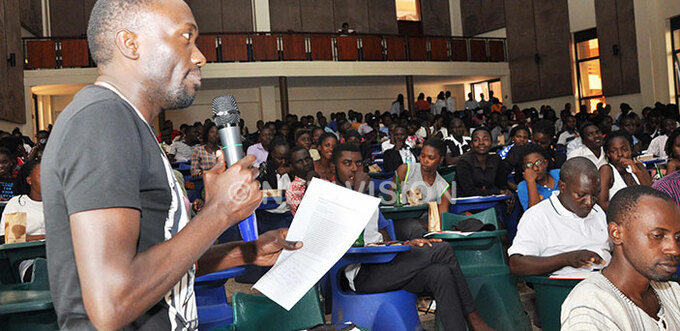Kyambogo introduces curriculum on cultural heritage
This year, the university was selected by the Cross-Cultural Foundation of Uganda having got funding from UNESCO to write a curriculum on cultural heritages to be taught in Ugandan Universities.
CULTURE EDUCATION
Kyambogo University has introduced a new curriculum where students will be learning about intangible and tangible cultural heritage.
According to UNESCO, tangible cultural heritage refers to physical art facts produced, maintained and transmitted intergenerationally in a society. These include artistic creations, built heritage such as buildings and monuments
Intangible cultural heritage refers to the practices, representations, expressions, knowledge, skills as well as the instruments, objects, art facts and cultural spaces associated therewith certain communities, groups and, in some cases, individuals.
This year, the university was selected by the Cross-Cultural Foundation of Uganda having got funding from UNESCO to write a curriculum on cultural heritages to be taught in Ugandan Universities.
Kyambogo university dean, faculty of arts and social sciences, Dr. Elizabeth Kyazike said they wrote a bachelors program to be studied by students for three years in universities.
In this, they partnered with three other universities including Islamic University In Uganda (IUIU), Kabale University, and Uganda Martyrs University Nkozi to start the program and later other universities will be free to roll it out as well.
The universities will start enrolling students for this course next year (2020).
Kyazike said the program will help the country get more experts in the cultural heritage field as it will contain aspects of history, performing arts, ethics, heritage economics, and cultural heritage impact assessment among others.
"There are currently few experts to help out in cultural heritage impact assessment especially where there are developments like oil, road constructions and others," she said.

Peter Sserubidde , an assistant lecturer from the department of languages and communication highlights key issues during the cultural heritage public lecture at Kyambogo University. (Photo by Juliet Kasirye)
Why teach cultural heritage
Kyazike said it is important to teach Ugandans about heritage because they can pick many good lessons from the past and apply them in the current life for development.
Usually cultural heritage has been presented in a negative way, however Kyazike said there positive aspects that people can carry on to the present generation.
Who is eligible for the course?
For one to take on a bachelor in cultural heritage, one needs to offer subjects in line with humanities like history, geography, religious studies among others.
Kyazike said one will need two principal passes or a diploma in relating fields like tourism to enroll for the course.
"We can also take in those that do sciences as this will be a multidisciplinary course." she said.
Popularising the course
To popularize the course Kyambogo University organised a public lecture on cultural heritage under the theme ‘African Motherhood Proverbs, A Matriarchal Perspective'.
While presenting at the lecture, Prof. Sr. Dominic Dipio said there is so much wealth in the Africa cultural resources that are not paid attention too.
Sr. Dipio said in most of the African folk tells, there are many heavy messages. For example she said, most of these outline the mother as the most single central person.
Sr. Dipio has been doing research around the African continent to find out how men started dominating the female that in the past was looked at as the most important figure.
"There is no community or proverb that trains men to beat or kill women like we see it today. These were taboos in the African setting. We do not have to go anywhere for solution to problems in our communities, we have all the answers entailed in our cultural heritage," she said.
She, however, said some of the old proverbs on women propagate gender inequality against women sighting out an African proverb that says ‘Having two wives is having two pots of poison.
She said Africans should asses what they do today and find out whether it reflects what their culture says.
Sr. Dipio said it is important to teach youth about our cultural heritage because it is youth that commits various shameful acts like battering women.
What others say
Kyambogo university lecturer John Kintu said female (matriarchal) and male (patriarchal) move together as one as each has its own responsibility in a family.
"We should get away to join the father and mother instead of looking for who is the superior of the other.
Martin Adupa a Kyambogo university said although people are trying to advocate for a matriarchal society, nature has it that men lead today.
"Whenever there is a problem especially financially in a family, women tend to flee the homes and leave men to solve them alone," he said.
Tangible Cultural Heritage refers to physical art facts produced, maintained and transmitted intergenerationally in a society. These include artistic creations, built heritage such as buildings and monuments.
Intangible Cultural Heritage refers to the practices, representations, expressions, knowledge, skills as well as the instruments, objects, art facts and cultural spaces associated therewith certain communities, groups and, in some cases, individuals.